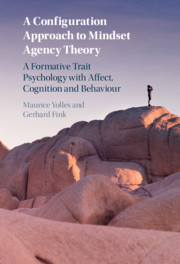 A Configuration Approach to Mindset Agency Theory
A Configuration Approach to Mindset Agency Theory Book contents
- A Configuration Approach to Mindset Agency Theory
- A Configuration Approach to Mindset Agency Theory
- Copyright page
- Contents
- Figures
- Tables
- Foreword
- Introduction
- Part I Cybernetic Sociopsychology and Agency
- Part II From Cognition to Affect
- Part III Modelling Identity Types through Agency
- Part IV Formal Possibilities in Mindset Agency Theory
- Chapter 13 Introduction to Psychohistory and Formalism
- Chapter 14 Illustrating Psychohistory
- Summarising Narrative for Part IV
- Part V Conclusion
- Book part
- Notes
- Glossary
- References
- Index
Chapter 14 - Illustrating Psychohistory
from Part IV - Formal Possibilities in Mindset Agency Theory
Published online by Cambridge University Press: 28 July 2021
- A Configuration Approach to Mindset Agency Theory
- A Configuration Approach to Mindset Agency Theory
- Copyright page
- Contents
- Figures
- Tables
- Foreword
- Introduction
- Part I Cybernetic Sociopsychology and Agency
- Part II From Cognition to Affect
- Part III Modelling Identity Types through Agency
- Part IV Formal Possibilities in Mindset Agency Theory
- Chapter 13 Introduction to Psychohistory and Formalism
- Chapter 14 Illustrating Psychohistory
- Summarising Narrative for Part IV
- Part V Conclusion
- Book part
- Notes
- Glossary
- References
- Index
Summary
Mindset Agency Theory delivers a formal trait psychology linked with Frieden‘s (1998) formulaic Extreme Physical Information (EPI). Recalling that there are two types of agency, cognition and affect/emotion that interact to create behaviour, both are deemed to be adaptive complex systems with trait movements that satisfy non-linear dynamics – such dynamics usefully described by Levin (2002). The intention here is to deliver only a snapshot of what a formal psychohistory might deliver by exploring the relationship between the interactive meso agents of a general formative trait that vie to attract that it.
- Type
- Chapter
- Information
- A Configuration Approach to Mindset Agency TheoryA Formative Trait Psychology with Affect, Cognition and Behaviour, pp. 470 - 500Publisher: Cambridge University PressPrint publication year: 2021
